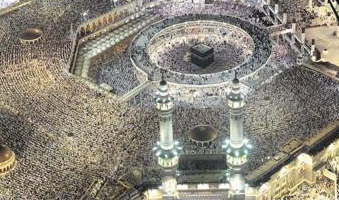 Makkah, Aug 6: Two million worshippers spent the 27th night of the holy month of Ramadan in the Grand Mosque seeking God's blessings. High security and integrated services contributed to a smooth flow of movement among worshippers filing in and out of the Grand Mosque.
Makkah, Aug 6: Two million worshippers spent the 27th night of the holy month of Ramadan in the Grand Mosque seeking God's blessings. High security and integrated services contributed to a smooth flow of movement among worshippers filing in and out of the Grand Mosque.
Security forces were deployed for crowd management, in addition to a special emergency force, the security force for Haj and Umrah and the security force responsible for training police staff. In addition, 10 government agencies extended support to these forces by providing health and other services to worshippers.
“With the beginning of the 27th of Ramadan, the third stage of the crowd management plan at the Grand Mosque was successfully implemented to control and manage the huge influx of people entering the Grand Mosque and its courtyards,” said Brig. Saad Al-Khlaiwi, deputy commander of Haj forces and director of Haj Training Centers.
Col. Saeed Salem Al-Qarni, director of security patrols in Makkah, said about 300 security personnel were patrolling the areas and helping other agencies streamline the movement of pilgrims.
Brig. Khalaf Al-Mutrafi, director general of Civil Defense in Makkah, said that Civil Defense forces exercised a high degree of efficiency during this holy night. “The number of staff was increased to meet the stiff increase in the number of pilgrims and visitors,” Al-Mutrafi said, adding that the situation required further precautionary measures to maintain order and minimize hazards as much as possible for the safety of people there. “It is a blessing that all worshippers performed the holy rituals safely and with ease,” he added.
Yahiya Al-Zahrani, commander of the Grand Mosque force, said that although the premises of the Grand Mosque, the roofs, the first floor, the corridors and the courts surrounding the mosque reached maximum capacity, worshippers performed their prayers and the holy rituals comfortably. “The implementation of the plan of this night in particular greatly contributed to the smooth streamlining of people,” he added.
“The movement of worshippers inside and outside the Grand Mosque was being monitored by 750 display screens and more than 1,000 digital cameras,” Al-Zahrani said, adding that a special security force was dedicated to safeguarding the Al-Mataf Bridge.
Brig. Gen. Abdulrahman Al-Muqbil, director-general of the traffic department, said that more than 4,000 security men, including 2,500 police trainees and 1,500 members of the General Directorate of Traffic, as well as the traffic department staff in Makkah, implemented the traffic plan for the night. “This greatly contributed to the smooth flow of crowds within the holy city,” he said, adding that they were deployed in the central area, shopping centers, streets and squares.





Comments
Add new comment